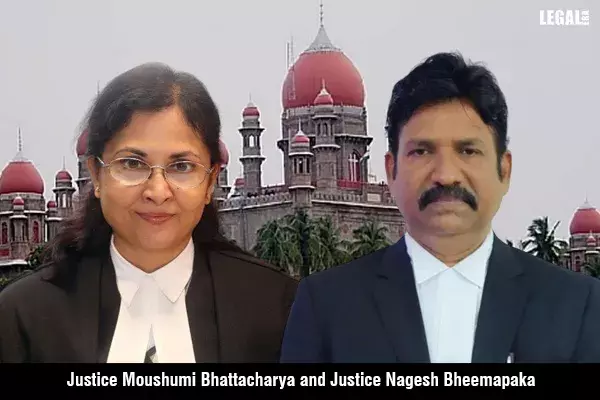Telangana High Court Upholds Civil Court Jurisdiction In Share Title Determination, Excludes NCLT/NCLAT
The Telangana High Court bench, comprising Justice Moushumi Bhattacharya and Justice Nagesh Bheemapaka, has ruled that;

Telangana High Court Upholds Civil Court Jurisdiction In Share Title Determination, Excludes NCLT/NCLAT
The Telangana High Court bench, comprising Justice Moushumi Bhattacharya and Justice Nagesh Bheemapaka, has ruled that determining the ownership of shares falls under the jurisdiction of civil courts, not the NCLT/NCLAT. They emphasized that Section 430 of the Companies Act applies only after the ownership dispute over the shares is resolved.
Section 430 of the Companies Act, 2013, limits the authority of civil courts in matters falling under the jurisdiction of the National Company Law Tribunal (NCLT) or the National Company Law Appellate Tribunal (NCLAT). This provision aims to prevent civil courts from intervening in matters within the purview of these specialized tribunals.
The Telangana High Court bench, comprising Justice Moushumi Bhattacharya and Justice Nagesh Bheemapaka, has ruled that determining the ownership of shares falls under the jurisdiction of civil courts, not the NCLT/NCLAT. They emphasized that Section 430 of the Companies Act applies only after the ownership dispute over the shares is resolved.
Section 430 of the Companies Act, 2013, limits the authority of civil courts in matters falling under the jurisdiction of the National Company Law Tribunal (NCLT) or the National Company Law Appellate Tribunal (NCLAT). This provision aims to prevent civil courts from intervening in matters within the purview of these specialized tribunals.
Cherukuri Ramakrishna ("Appellant"), a significant shareholder in M/s. Sunbeam Hospitality Private Limited, along with other shareholders, entered into agreements including an MOU, Share Purchase Agreement, and Takeover Agreement with Sandhya Hotels Private Limited and others ("Respondents") for the transfer of their shares. According to the agreements, the respondents were to pay Rs. 20,04,50,700 to the appellant. However, they only paid Rs. 19,37,50,700/-, leaving Rs. 67,00,000/- unpaid.
Alleging that the respondents fraudulently took over the appellant's shares without completing the payment and subsequently removed the appellant as director before assuming control of the company, the appellant filed a complaint in the City Civil Court at Hyderabad. The complaint sought a mandatory injunction and a re-transfer of 10,197 shares in M/s. Sandhya Hospitality Private Limited. The trial court dismissed the complaint, prompting the appellant to appeal to the high court.
The appellant argued that Sections 430, 58, and 59 of the Companies Act, 2013, were not applicable to the case. He contended that the request for re-transfer of shares from the respondents to himself falls under the jurisdiction of a civil court rather than the NCLT or NCLAT. The argument was supported by specific references to the pleadings in the complaint, emphasizing that the issues raised do not fall within the jurisdiction of the NCLT or NCLAT.
In response, the respondents asserted that Sections 430, 58, and 59 of the Companies Act, 2013, explicitly prohibit civil courts from adjudicating disputes that fall under the jurisdiction of the NCLT or NCLAT. They further argued against arbitration under Clause 8 of the 2015 Share Purchase Agreement, citing that the appellant was one of several 'Transferors' involved in the agreement.
The High Court referred to Clause 8 of the Share Purchase Agreement (SPA), which mandates arbitration in Hyderabad under the Arbitration and Conciliation Ordinance, 1996, for disputes arising between the transferors and transferees. The lower court's dismissal of the complaint rested on this arbitration clause, asserting that the dispute fell outside its jurisdiction and should proceed through arbitration.
However, the High Court disagreed with this stance. It acknowledged the arbitration clause's validity for resolving SPA-related disputes but emphasized that the appellant could file for arbitrator appointment under Section 11 of the Arbitration and Conciliation Act, 1996. The High Court deemed premature the Respondents' objection that the Appellant could not unilaterally seek arbitration without involving all parties to the SPA, noting that such issues arise only upon filing the application.
Regarding Sections 430, 58, and 59 of the Companies Act, 2013, the High Court reviewed their applicability to the appellant's suit. It clarified that Section 430 aims to prevent civil courts from intervening in matters within the NCLT or NCLAT's jurisdiction. Sections 58 and 59, dealing with securities transfer registration and member register rectification, pertain post-resolution of share ownership, squarely within Civil Court jurisdiction.
The High Court affirmed that share ownership determination falls exclusively under Civil Court purview, citing Section 58(2)'s proviso enforcing transfer contracts as crucial. It highlighted the respondents' inconsistent stance on shareholder petitions under Sections 241 and 242 of Section 59, challenging NCLT jurisdiction.
The High Court upheld the plaintiff's claims of wrongdoing by the respondents—partial payment for shares, unauthorized share transfers—asserting these as civil court matters, not within NCLT scope. It concluded that such allegations, though not explicitly fraudulent, warrant civil court adjudication.
Thus, the High Court ruled that the complaint addressing individual rights and share ownership must proceed in civil court, not the NCLT, affirming the appellant's right to pursue the suit under Sections 430, 58, and 59 of the Companies Act, 2013.
Consequently, the High Court overturned the Civil Court's order.

